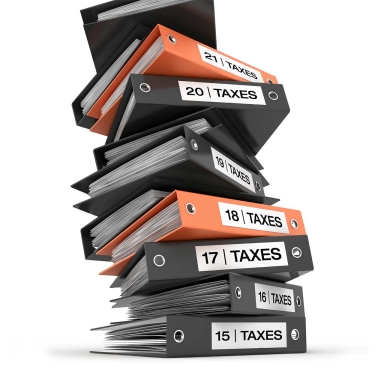Looking for your Refund - Here is a link to our refund tracker
Learn moreBack taxes 101

If the phrase “back taxes” sends a shudder down your spine, you’re not alone. Unpaid taxes aren’t uncommon, but disregarding back taxes can put you at risk for increased liabilities and accrued penalties, which can be detrimental to your finances. Knowing where to start can be the hardest part, so let’s dive into what you can do if you owe taxes and cannot pay.
Back taxes defined
Simply put, back taxes are local, state and/or federal taxes that have been partially or fully unpaid in the year they’re due. This can happen when taxpayers file a return but don’t pay the tax liability, fail to report all income earned during the tax year or neglect to even file a tax return.
In the case where a return isn’t filed, there is a failure-to-pay penalty of 0.5% of the amount due. This applies every month or part of a month until the tax is paid in full, or until the penalty reaches 25% of the original tax balance owed.
The IRS also considers back taxes to be the equivalent of a loan, so they charge interest (yes, in addition to the penalties you pay) on the amount due. Not only that, but they change the interest rate every three months by calculating the federal short-term rate plus 3%.
It’s in your best interest to pay back taxes as quickly as possible…before the IRS uses aggressive collection tactics to recoup what they’re owed.
IRS tax notices
If you don’t pay your taxes in full when you file your tax return, you’ll first receive a bill from the IRS for the amount you owe. This bill starts the collection process until your account is paid in full or until the IRS can no longer legally collect the tax (i.e., when the time or period for collection expires).
The first notice you’ll receive will be a letter that explains the balance due. It will also demand payment in full, which includes the amount of the tax, plus any penalties and interest accrued from the date the tax was due. It’s important to remember that legitimate tax notices will arrive via mail and no other delivery method (e.g., text, email or phone call).
If you believe your notice was issued in error or if you have questions, you can write to the IRS office that sent the letter within the timeframe provided or call the number listed on the notice for assistance.
Options for payment
While it’s best to pay your balance in full if you’re able to do so, there are a few options available to you when you owe back taxes and can’t pay the balance immediately.
1. Installment agreements
The IRS allows taxpayers to set up a payment plan within an extended timeframe if they’ll be able to pay their taxes in full within that timeframe. A short-term payment plan allows taxpayers to pay the amount owed within 180 days. A long-term payment plan allows taxpayers to set up a monthly payment plan. It’s important to note that there may be fees to set up payment plans, and penalties and interest will continue to accrue until the balance is paid in full.
2. Offer in compromise
This option allows you to settle your tax debt for less than the full amount owed if paying your full tax liability will create a financial hardship. Taxpayers must meet several eligibility requirements and apply for an offer in compromise. The IRS recommends exploring all other payment options before submitting an offer in compromise.
3. Currently not collectible status
For taxpayers needing more time to pay, a request to delay collection of payment and report their account as “currently not collectible” is an option. The IRS will ask you to complete a Collection Information Statement (Form 433-F, Form 433-A or Form 433-B) and may temporarily delay collection until your financial condition improves. Under this option, the debt doesn’t go away and will continue to accrue penalties and interest until the debt is fully paid.
IRS collection tactics
If back taxes continue to go unpaid, the IRS will become more aggressive in collecting a debt, including filing a tax lien, issuing a levy or garnishing wages.
Liens allow the government to make a legal claim against your property, like real estate, personal property and financial assets. It can also include future assets acquired while there’s a lien against you.
Levies permit the legal seizure of your property (e.g., retirement accounts, bank accounts, physical assets, pending wages) to satisfy your debt.
Wage garnishment allows the IRS to direct your employer to deduct a predetermined amount from each paycheck to be sent directly to the IRS. This garnishment also applies to bonuses, tax refunds and unexpected funds.
Resolve back taxes…quickly
Receiving a notice about back taxes can be alarming, but the most important thing to remember is to pay that debt quickly. If you have questions or concerns about a tax notice, contact a tax professional to determine the best option for your situation.
Back to issue









